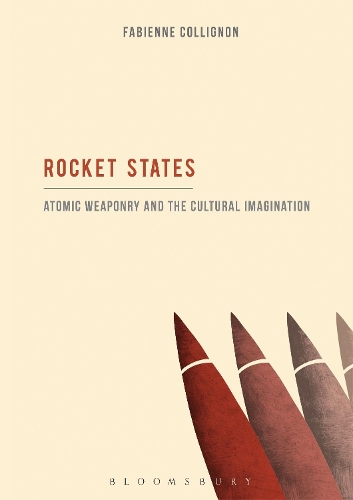
Rocket States: Atomic Weaponry and the Cultural Imagination
(Paperback)
Available Formats
Publishing Details
Rocket States: Atomic Weaponry and the Cultural Imagination
By (Author) Dr. Fabienne Collignon
Bloomsbury Publishing PLC
Bloomsbury Academic USA
28th January 2016
United States
Classifications
Tertiary Education
Non Fiction
Cold wars and proxy conflicts
History of the Americas
810.9005
Physical Properties
Paperback
192
Width 152mm, Height 229mm
259g
Description
Rocket States crosses the disciplines of Cold War Studies, American Literature, American Studies and Cultural Studies. The particular attraction of this study lies in the combination of its rangeclose textual and visual analysis of the correlations between land and weaponry, set firmly within its political and cultural contextswith its unique analytical approach. The book offers a synthesis between history, theories of technology, theories of space, popular culture, literary study and military science. It illuminates a variety of literary texts from key writers and thinkers such as Pynchon, Stephen King, Norman Mailer, and Tom Wolfe, while also invoking figures like Nikola Tesla, James Webb, Batman and Ronald Reagan. Organised topographically, according to how missile technology manifests itself differently in particular locations, Rocket States's geographical targets are Colorado, Kansas, Cape Canaveral and New York, variously titled 'Excavation', 'Preservation', 'Evacuation' and 'Transmission'. It advances through these states roughly chronologically, beginning in the late 1940s and early 1950s and coming to an end in the first part of the 21st century. Collignon's argument is concerned with identifying the recurring figures and fantasies of the Cold War: the dome or parabola as sheltering techno-form; the fictions of total security adapting to constantly changing targeting strategies; gadget love; closed, freezing worlds. As such, Rocket States analyses by what processes the Cold War is frequently literalised in its weapons installations and how these facilities, in turn, shape dreams of containment, survival, escape and techno-supremacy.
Reviews
[A] feat of solid scholarship ... and a rewarding read ... There are many ideas here that open new perspectives and point at very interesting lines of scholarly research ... It is what lies beyond Rocket States, the trails that start from its pages, which is absolutely relevant to any Pynchon scholar, making this book a must-read for all of us. * Orbit: Writing Around Pynchon *
Rocket States is a fascinating study of how cultural fantasy shapedand continues to shapethe U.S. security state. Fabienne Collignon reads the technological infrastructure of the Cold War as the product of a national dream-work, deeply influenced by collective desires and anxieties. With careful attention to military artifactsfrom radar and weapons systems to rockets, satellites, lasers, and information networksshe reveals the lines of force running through an impressive array of narratives, theories, films, and cultural icons. The result is a compelling vision of the bizarre psychodynamics of a deadly serious episode in U.S. history. * Timothy Melley, Professor of English, Miami University, USA, and author of The Covert Sphere: Secrecy, Fiction, and the National Security State *
Compellingly written and hauntingly imagined, Rocket States maps Thomas Pynchons Gravitys Rainbow onto the post-nuclear winter that slowly unfolds now across the traumatized cultural landscape of the twenty-first century. Here, missile technologies in the empty deserts of the American mind are viewed as talisman of the planets actual disappearance into increasingly phantasmatic dream-states, accumulating violence, and suicidal fantasies of mass exterminism. In effect, Rocket States is what happens when the death-drive wears the mask of virulent technologies of nuclear warfare. * Arthur Kroker, Canada Research Chair in Technology, Culture and Theory, the University of Victoria, Canada, and author of Exits to the Posthuman Future *
Author Bio
Fabienne Collignon is Lecturer in Contemporary Literature at the University of Sheffield, UK. She has published articles on American techno-culture and machine aesthetics in journals such as C-Theory, Configurations, and Textual Practice.
